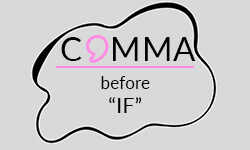
It is beneficial to prioritize the correct usage of commas in academic papers, as they enable clarity and structure in sentences, giving them correct meanings. Since many students are not familiar with the grammatical rules of comma usage, it isn’t uncommon for some contextual mistakes to occur. By giving a clear insight into the rules of commas with the example of whether to place a comma before the subordinating conjunction “if,” this article aims to clarify this phenomenon.
When to place a comma before “if”
In essence, there are three main rules that determine that a comma must be placed before “if.” When “if” introduces a non-essential clause or element, precedes an introductory phrase, or follows a transition phrase in the middle of a sentence, a comma must be placed.
Comma
Introducing non-essential clauses
After an introductory phrase
After transition phrases
No comma
Dependent clause after main clause
“If” as a noun
Comma rules may vary depending on different Style Guides. In general, it is to be considered whether the sentence is easily understood without using a comma and provides the correct meaning. In English, there are often cases of optional comma placement depending on stylistic choices and the structure of a sentence.
Comma before “if”
A comma should be placed before “if,” when it introduces non-essential clauses, which entail information that is not necessary for the complete meaning of the main sentence. A comma should also be placed, when an “if”-clause follows an introductory phrase or a transition phrase.
Introducing non-essential clauses
When “if” stands in the initial position of a non-essential clause or element, it is necessary to place a pre-comma. Non-essential clauses contain information that is not necessary to the complete meaning of a sentence. Commas are set to clearly separate these parenthetical elements, as they are independent structures, no matter where they are placed in a sentence.
After an introductory phrase
Introductory phrases are parenthetical elements that are at the beginning of a sentence. They can be words, phrases, or clauses. They typically begin a sentence to provide contextual background for the preceding discourse or argument.
After transition phrases
When transition phrases are placed in the middle of a sentence and followed by an “if”-clause, it is necessary to place a comma before “if.” Transition phrases are connective devices and are frequently used to create clear links between ideas in sentences.
No comma before “if”
Essentially, a comma before “if” is omitted, when it introduces a dependent clause after an independent clause. Dependent clauses cannot stand on their own, as they do not have a logical meaning without the first part of a sentence. A comma should also be avoided when “if” acts as a noun.
Introducing dependent clause after main clause
When “if” introduces a dependent clause, also called subordinate clause, the comma must be left out, as dependent clauses are essential elements to a sentence, meaning they cannot stand independently.
Note: If a parenthetical stands in front of a subordinate “if”-clause, you should place a comma.
“If” functioning as a noun
As presented in this article, the explanations and descriptions include “if” acting as a noun, often as a subject or object. We separate “if” from the context by enclosing it in quotation marks to improve the readability. However, if quotation marks or other formattings aren’t optional, you should still not place a comma prior “if” to indicate a separation unless it is essential in the overall sentence structure.
Test yourself!
Practice sheet
You can check your understanding of using commas before “if” by taking this test. The correct answers can be found in the second tab.
- I want to if I may share my thoughts now.
- My dad will if the need arises pick us up after the party.
- The doctor’s diagnosis if accurate, was not very pleasant.
- Susan is if you remember, a professor at Harvard University.
- We can go to the beach next week if it is sunny.
- I will ask my mother’s opinion if she is at home.
- You should go the hospital if you have severe bleeding.
- Your brother wouldn’t call me this late if it wasn’t so urgent.
- When if introduces a subordinate sentence, no comma is needed.
- You can always follow God if you believe in spirituality.
- I want to, if I may, share my thoughts now. (Comma)
- My dad will, if the need arises, pick us up after the party. (Comma)
- The doctor’s diagnosis, if accurate, was not very pleasant. (Comma)
- Susan is, if you remember, a professor at Harvard University. (Comma)
- We can go to the beach next week if it is sunny. (No comma)
- I will ask my mother’s opinion if she is at home.(No comma)
- You should go the hospital if you have severe bleeding. (No comma)
- Your brother wouldn’t call me this late if it wasn’t so urgent. (No comma)
- When “if” introduces a subordinate sentence, no comma is needed. (No comma)
- You can always follow God if you believe in spirituality. (No Comma)
- ✓ Free express delivery
- ✓ Individual embossing
- ✓ Selection of high-quality bindings
FAQs
An example sentence is:
- I always go, if I have time, to my parents.
When “if” introduces a dependent clause, and it is preceded by the independent clause, you should place a comma before “if.” A comma should also be placed before “if,” when it introduces non-essential information to the complete meaning of a sentence in the form of a phrase or a clause.
Example
- He told me, that if I needed anything, I could call him.
Yes, you need a comma before “whether” in the case of a so-called non-essential phrase. A non-essential phrase represents additional information that isn’t needed for the complete meaning of the sentence.
Example
- I haven’t decided yet, whether I will come to you or go to my brother’s.
